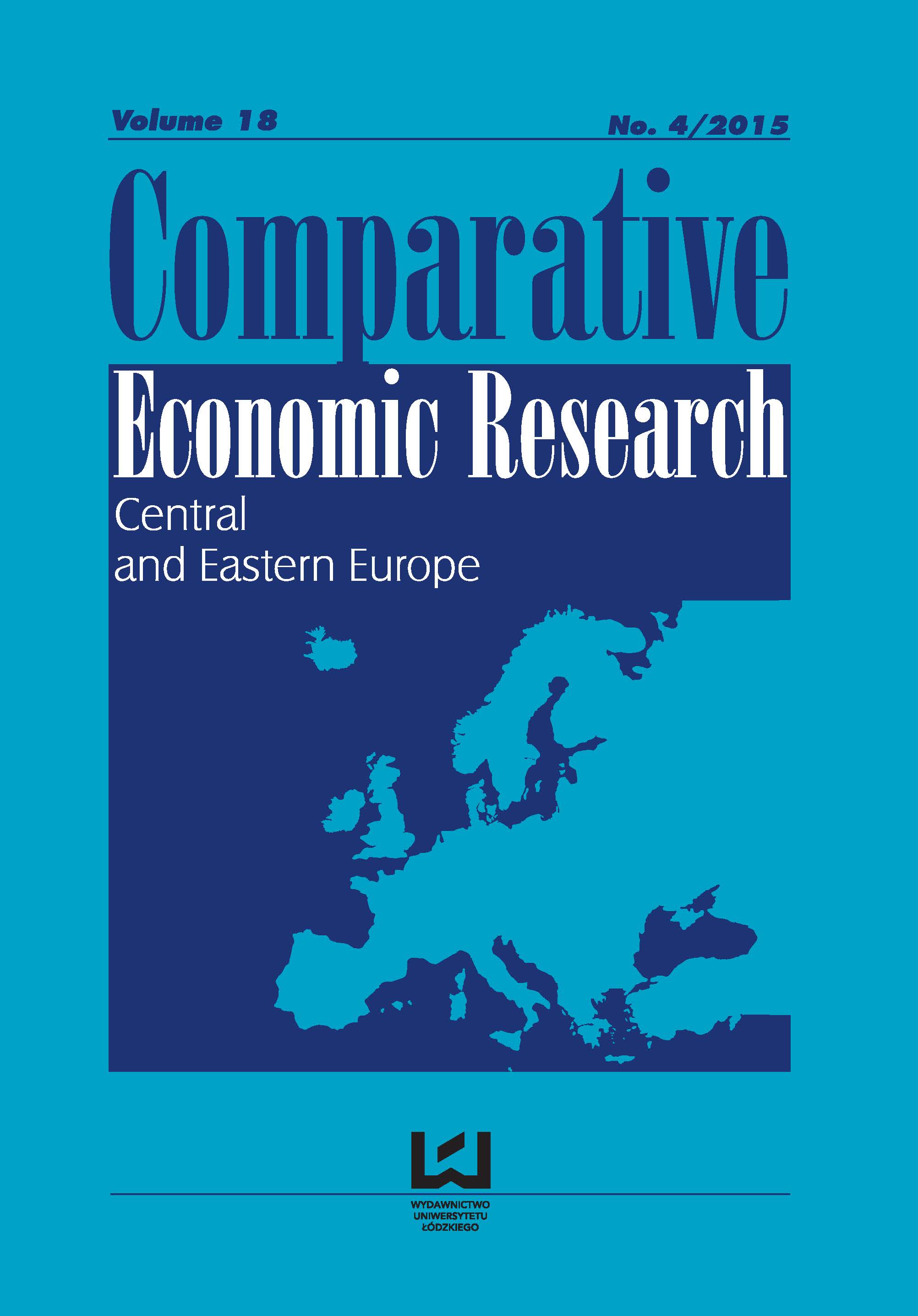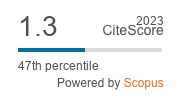Catching Up And Falling Behind: Four Puzzles After Two Decades Of Post-Communist Transformation
DOI:
https://doi.org/10.1515/cer-2015-0029Keywords:
post-communism, catching up growth, qualitative comparative analysis, market reforms, location, EU membership, war, natural resources, statehoodAbstract
After more than two decades since the exit from Communism, no former communist country has been completely successful in catching up with the technological frontier countries. However, they divide into two groups: those which decreased the GDP gap with frontier countries since 1989-1990, and those which failed to do so. One may ask: What were the decisive causal conditions for their progress or failure in convergence? Were they the early implementation of Washington consensus style market reforms; their neighbourhood with advanced affluent countries; peaceful transition; accession to the EU; endowment with natural resources; state sovereignty before postcommunism; or interactions between these factors (or others)? Because of the small N, statistical analysis is not an appropriate tool for testing these hypotheses. Hence this paper uses qualitative comparative analysis to identify four explanatory puzzles of the catching-up growth performance of the postcommunist countries.
Downloads
References
Adalian R. P. (2010), Historical Dictionary of Armenia. 2nd ed., Scarecrow Press, Lanham, Md.
Google Scholar
Balcerowicz L. (1995), Socialism68, Capitalism, Transformation, Central European University Press, Budapest.
Google Scholar
Balmaceda M. (2013), The Politics of Energy Dependency: Ukraine, Belarus, and Lithuania Between Domestic Oligarchs and Russian Pressure, 1992-2012, University of Toronto Press, Toronto.
Google Scholar
Berg-Schlosser D. (2012), Mixed Methods in Comparative Politics: Principles and Applications, Palgrave, Houndmills.
Google Scholar
Campos N., Coricelli F., Moretti L. (2013), Economic Growth and European Integration: a Counterfactual Analysis. http://extranet.isnie.org/uploads/isnie2013/campos_coricelli_moretti.pdf 20.07.2015.
Google Scholar
Caramani D. (2009), Introduction to the Comparative Method with Boolean Algebra, Sage, Los Angeles.
Google Scholar
Colgan J. D. (2013), Petro-Aggression: When Oil Causes War, Cambridge UP, New York.
Google Scholar
Cox J. (2005), Slovenia. Evolving Loyalties, Routledge, London.
Google Scholar
Cronqvist L. (2007), Konfigurationelle Analyse mit Multi-Value QCA als Methode der Vergleichenden Politikwissenschafts mit einem Fallbeispiel aus der Vergleichenden Parteienforschung (Erfolg Grüner Parteien in den achtziger Jahren). http://archiv.ub.uni-marburg.de/diss/z2007/0620/pdf/cronqvist.pdf 20.07.2015.
Google Scholar
Cronqvist L. (2011), Tosmana: Tool for Small-N Analysis [Computer Programme], Version 1.3.2.0. University of Trier, Trier. http://www.compasss.org/files/tosmana_1312.zip 20.07.2015.
Google Scholar
Eurostat (2014), GDP per capita in PPS. http://ec.europa.eu/eurostat/tgm/table.do?tab=table&init=1&language=en&pcode=tec00114&plugin=1 20.07.2015.
Google Scholar
Karmazinaitė S., Maniokas K., Žeruolis D. (2014), Lietuvos dešimtmetis Europos Sąjungoje: dideli lūkesčiai, maži pokyčiai? [Ten Years of Lithuania in the EU: High Expectations, Low Transformation?]‚ ‘Politologija‘, Vilnius University Press, Nr. 4 (76), pp. 40-91. http://www.zurnalai.vu.lt/politologija/article/view/4875/3131 20.07.2015
Google Scholar
King L. P. (2001), The Basic Features of Post-Communist Capitalism: Firms in Hungary, the Czech Republic, and Slovakia, Praeger Press, Westport, Conn.
Google Scholar
Kuzio T. (2001), Transition in Post-Communist States: Triple or Quadruple?, ‘Politics‘, Wiley, Vol. 21, Nr. 1, pp. 168-177.
Google Scholar
Laar M. (2002). Estonia: Little Country that Could, Centre for Research into Post- Communist Economies, London.
Google Scholar
Lankina T. V., Getachew L. (2006), A Geographic Incremental Theory of Democratization: Territory, Aid, and Democracy in Postcommunist Regions, ‘World Politics‘, Cambridge UP, Vol. 58, Nr. 4, pp. 536-582. doi: 10.1353/wp.2007.0011
Google Scholar
Lauristin M., Vihalemm P. (2009), The Political Agenda During Different Periods of Estonian Transformation: External and Internal Factors, ‘Journal of Baltic Studies‘, Routledge, Vol. 40, Nr.1, pp.1-28. doi: 10.1080/01629770902722237
Google Scholar
Lauristin M., Norkus Z., Vihalemm P. (2011), On Sociology’s Contribution to Knowledge of the Baltic Way, ‘Sociologija. Mintis ir veiksmas‘, Vilnius University Press, Nr. 2 (29), pp. 128-155. http://www.journals.vu.lt/sociologija-mintis-ir-veiksmas/article/download/6129/5037 20.07.2015
Google Scholar
Luong P. J., Weinthal E. (2006), Rethinking the Natural Resource Curse: Ownership Structure, Institutional Capacity, and Domestic Constraints, ‘Annual Review of Political Science‘, Annual Reviews, Vol. 9, pp. 241-263. doi: 10.1146/annurev.polisci.9.062404.170436
Google Scholar
Norkus Z. (2012), On Baltic Slovenia and Adriatic Lithuania. A Qualitative Comparative Analysis of Patterns in Post-Communist Transformation, Apostrofa, Vilnius.
Google Scholar
Norkus Z., Morkevičius V. 2011. Kokybinė lyginamoji analizė. Vadovėlis aukštųjų mokyklų studentams [Qualitative Comparative Analysis. A Textbook for Higher School Students], Lietuvos HSM duomenu archyvas (LiDA), Kaunas.
Google Scholar
Offe C. (1991), Capitalism by Democratic Design? Democratic Theory Facing the Triple Transition in East Central Europe, ‘Social Research‘, John Hopkins UP, Vol. 58, Nr. 4, pp. 865-892.
Google Scholar
Ploeg van der F., Venables A. J. (2012), Natural Resource Wealth: The Challenge of Managing a Windfall, ‘Annual Review of Economics‘, Annual Reviews, vol. 4: pp. 315-337.
Google Scholar
Ragin Ch. C. (1987), The Comparative Method: Moving Beyond Qualitative and Quantitative Strategies, University of California Press, Berkeley.
Google Scholar
Ragin Ch. C. (2000), Fuzzy-set Social Science, Chicago University Press, Chicago.
Google Scholar
Ragin Ch. C. (2008), Redesigning Social Inquiry: Fuzzy Sets and Beyond, The University of Chicago Press, Chicago.
Google Scholar
Rihoux B., Ragin Ch. eds. (2009), Confgurational Comparative Methods: Qualitative Comparative Analysis (QCA) and Related Techniques, Sage, Thousand Oaks.
Google Scholar
Ross M., Homer E. (1976), Galton’s Problem in Cross-National Research, ‘World Politics‘, Cambridge UP, Vol. 29, Nr. 1, pp. 1-28. doi: 10.2307/2010045
Google Scholar
Ross M. (2015), What Have We Learned about the Resource Curse?, ‘Annual Review of Political Science‘, vol. 18: pp. 239-259.
Google Scholar
Schaefer, J. M., ed. (1974), Studies in Cultural Diffusion: Galton‘s Problem. New Haven: HRAF.
Google Scholar
Schneider C. Q., Wagemann C. (2012), Set-Theoretic Methods for the Social Sciences: A Guide to Qualitative Comparative Analysis. Cambridge: Cambridge UP.
Google Scholar
Schweizer Th. (1987), Methodological Problems of Cross-Cultural Comparison, HRAF Press, New Haven.
Google Scholar
Stark D., Bruszt L. (1998), Postsocialist Pathways: Transforming Politics and Property in East Central Europe, Cambridge University Press, Cambridge.
Google Scholar
Thiem A., Duşa A. (2013), Qualitative Comparative Analysis with R: A User's Guide, Springer, New York.
Google Scholar
Walder A. ed. (1995), The Waning of the Communist State: Economic Origins of Political Decline in China and Hungary, University of California Press, Berkeley.
Google Scholar
Wallerstein I. (2000), The Essential Wallerstein, The New York Press, New York.
Google Scholar
Wallerstein I. (2004), World-systems Analysis: An Introduction. Duke University Press, Durham.
Google Scholar
Wick K., Bulte E. (2009), The Curse of Natural Resources, ‘Annual Review of Resource Economics‘, Annual Reviews, 1: pp. 139-55.
Google Scholar
Wilson A. (2011), Belarus: the Last Dictatorship in Europe. Yale UP, New Haven.
Google Scholar
World Bank (2002), Growth Challenges and Government Policies in Armenia. Washington, D.C. : World Bank. https://www.wdronline.worldbank.org/bitstream/handle/10986/14069/multi0page.pdf?sequence=1 20.07.2015.
Google Scholar
World Bank (2012), World Development Indicators 2012 May Release. http://data.worldbank.org/data-catalog/world-development-indicators/wdi-2012 20.07.2015.
Google Scholar
World Bank (2014), World Development Indicators 2015. http://data.worldbank.org/datacatalog/world-development-indicators 20.07.2015
Google Scholar
Downloads
Published
How to Cite
Issue
Section
License

This work is licensed under a Creative Commons Attribution-NonCommercial-NoDerivatives 4.0 International License.











